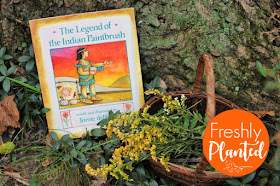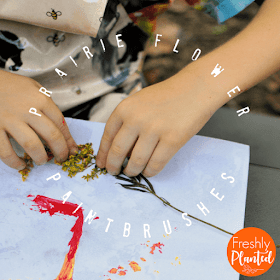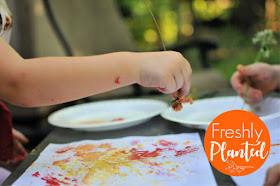Inside: A great nature activity after a hike! Collect flowers and use them as paintbrushes. This craft was inspired by Tomie dePaola's book, "The Legend of the Indian Paintbrush." Great for all nature lovers young and old- toddlers, preschoolers, elementary, and teenagers too.
This post may contain affiliate links.
(Some children are also born quiet, but they are not the ones running around our house!)
When going for a hike, I'll often bring a basket to collect these treasures. This prevents nature finds from being crushed- or found in the bottom of the washing machine days later. Later on they'll become a part of our nature shelf, a highest honor, or into our crafts.
And sometimes we paint with them.
Related: 25 Nature Books You Need To Read To Your Active Kid

The Legend of the Indian Paintbrush
Since we love flowers and art, the kids were excited to find "The Legend of the Indian Paintbrush" by Tomie dePaola. In the story, there's a boy who's not destined to grow up into a warrior like the other boys of his tribe. He grows up to be a painter who paints stories for his People to remember. One painting eludes him though- capturing the magnificent colors of the sunset."He used the brightest flowers, the reddest berries, and the deepest purples from the rocks, and still his paintings never satisfied him. They looked dull and dark."One day he receives a gift to help him, and this gift still flowers today in the desert: the Indian Paintbrush.
We don't have this beautiful flower in the Midwest, but we decided to use our native prairie flowers to paint our own sunsets instead.
Related: Easy Peasy Beginner Nature Journal Ideas for Kids
Nature Art: Prairie Flower Paintbrushes
This post is part of our Nature Book Club series, with more links below. Enjoy!
- A collection of wildflowers
- Sunset paint- red, orange, yellow acrylic paint for older kids, tempera for younger
- Hefty paper or canvas for painting
PREPARE:
- Cover your table or use lunch trays if you're painting with acrylic to prevent staining.
- Put a small drop of yellow onto a paint palette (we use the insides of cereal boxes, leftover Styrofoam, and other recycling goodies for ours)
- A small tub of soapy water or a large wet washcloth helps children who don't like messy hands clean them right away. Sometimes just knowing they "can" gives them the freedom to get messier than you'd think they would!
CREATE:
- Let your child dip their flower in the yellow paint and experiment with it on the paper. What happens if they drag it? What it they drag it harder, softer? What if they stamp it on the paper?
- Have them repeat with other flowers, experimenting with their different "paintbrushes."
- Introduce a smidgen of red onto their paint palette or onto their picture. What happens when it mixes with yellow? It only takes a little! (see HELPS below)
- Have fun!
HELPS:
- Yellow paint contains the lightest pigment and is easily tinted by other colors. It takes only a little red to turn yellow into orange, but it takes A LOT of yellow to do the same to red.
- Yellow, red and orange are on the WARM side of the color wheel. To help kids remember this, we call them "fire" colors.
- Fun fact: Warmer paint pigments are less dense than cool paint pigments. So it takes more warm paint to turn a cool paint (blue, green) warm then the other way around!





No comments:
Post a Comment
Note: Only a member of this blog may post a comment.